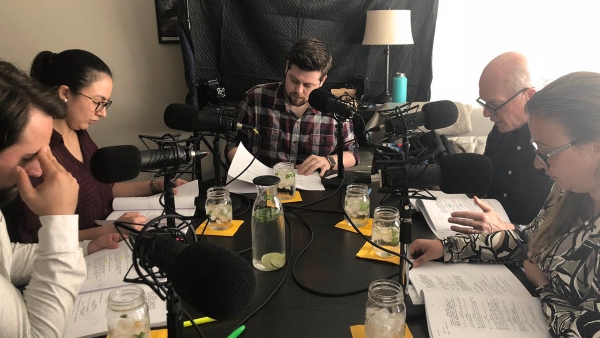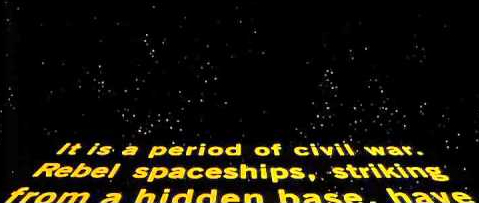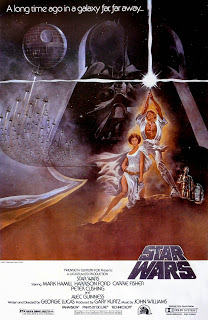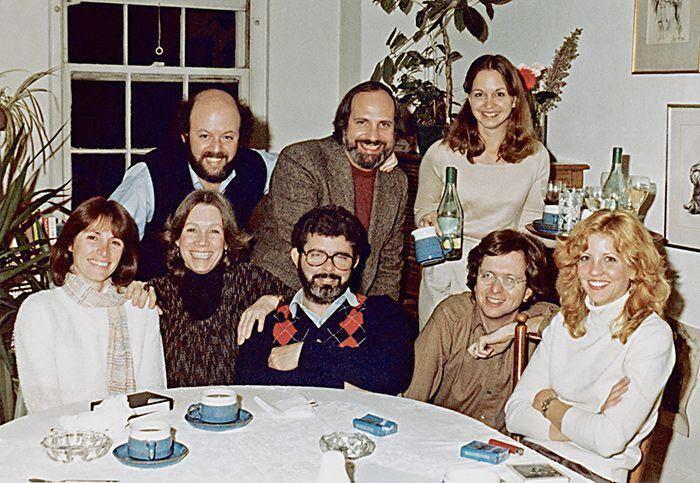LISTEN TO CLIP AT io9 - 6-PART 'BLOCKBUSTER' LOOKS AT SPIELBERG/LUCAS FRIENDSHIP

Blockbuster is a new six-part podcast created by Matt Schrader that looks at the friendship between Steven Spielberg and George Lucas as a docu-biopic for the ears. The podcast boasts strong sound design elements to present a scripted narrative using top voice actors, and an original score. It can be listened to on Apple and Spotify, but io9 has posted an exclusive two-minute clip in which Lucas shows the first early rough cut of Star Wars to a small gathering of friends. According to io9's Germain Lussier, Lucas is voiced by Ray Chase, Spielberg is voiced by Max Mittelman, Brian De Palma is voiced by Lex Lang (who also voices Harrison Ford elsewhere in the series), and Marcia Lucas is voiced by Julia McIlvaine.
Here's an excerpt from Lussier's interview with Schrader at io9:
io9: As writer and filmmaker yourself, how do you see the podcast as a new form of storytelling going ahead? Is Blockbuster the first of its kind?Schrader: I started my career as an investigative journalist with CBS and NBC, and I left to pursue my first documentary. After doing the whole theatrical release campaign for that, I really fell in love with this idea of immersive true stories...that I think transcends whatever platform it is, because there are so many ways to create stories nowadays: movies, TV, web videos, podcasts, Snapchat, etc. It all starts with a powerful story.
Steven Spielberg once said in an interview, “a great story is a great story,” which actually made it into one of his conversations with George in Blockbuster. So in some ways, I don’t know that the platform matters if it’s done well. It just so happens that podcasts are this massive new expanding world people are discovering right now, and sound and music are so vitally important to the story we wanted to tell.
io9: Did you have to get permission from anyone or any company involved to do this, or is it all fair rights? Meaning Fox, Universal, the individuals dramatized, etc.
Schrader: It was a very extensive process because these huge movies are part of the story arc, and how can you tell a story about Star Wars without mentioning Star Wars? I always kind of chuckle when I’m watching something on TV and there’s a generic version of “Coca-Cola” and it’s called something like “Cool-Cola.” We all know what they’re referencing, but it really takes the viewer away from the story. We wanted to make sure we weren’t overstepping anything creatively but could be realistic and use archival audio and music and film clips to tell the story. It did require the help of a legal and clearance team so we knew how we could include the opening of the 1976 Academy Awards telecast, for instance. I’m glad we went that route because it’s much more authentic and feels real.
io9: What were some of your primary sources in piecing together this story? Did any of the actual principals help at all? Did you reach out to them?
Schrader: Oh, so many sources. It ranged from letters and documents from their offices during that era, to newspaper clippings, and lots of video interviews. There have also been a number of books that touch on this era of filmmaking, so we were really trying to pinpoint the friendship of George and Steven in all of these sources, and create a biography of their friendship.
In my experience as a journalist, biographical stories can come off as “staged” if they directly involve their subjects, and we wanted to maintain journalistic standing, and avoid any criticism of being part of someone’s “public relations” team (which would do this story a disservice too). This is such a powerful story of inspiration, and struggle, and triumph—and it’s done in such respect and admiration for what George and Steven ultimately accomplished. We felt Blockbuster was best created 100 percent independently and journalistically. It’s always important to get as close as possible to the setting, however, so we prioritized interviews from the 1970s to try to get the most accurate descriptions of how it all really happened. We actually included one scene in which George meets one of the journalists who wrote about him on the set of Star Wars, which actually happened. So there are parts that can be very meta.
io9: The actual dialogue and interactions, closed-door private stuff—is that mostly educated guesswork or how did you go about approaching the writing of those scenes?
Schrader: It was one of the most interesting research projects I’ve ever done, and arguably the most unique part of this series because we started to piece together these moments, sort of like a detective would if investigating something. We would find these old archival interviews where George talks about meeting Steven, and someone else’s interview that says where they were, and someone else who described the environment that day. We started to take those millions of little jigsaw puzzle pieces and start to form a picture. Where we could, we tried to use their exact words, like when Brian De Palma saw Star Wars for the first time and asked George, “What is this shit?”
io9: Did you have any trouble putting together a crew, both above the line and below the line, for this mostly unfamiliar approach to storytelling? Were people skeptical?
Schrader: Well, it’s new and new things always require a little explanation. I was fortunate to meet some of the crew on my 2017 film Score: A Film Music Documentary, but this was an entirely different format. We kind of settled on this as being a “biopic podcast series” or “biopod,” which is a term for this genre we’ve sort of coined now.
Fortunately, sound designer Peter Bawiec was into this idea from the very start, and his passion shines through this series, especially in the scenes where we see Steven and George grappling with chaos around them.
I realize I just said “see,” which isn’t technically accurate, but it’s kind of like a good book in that your brain puts you right there with them on the set of Jaws and Star Wars.
Matt Schader also did an interview with Goseetalk's Marc Ciafardini. Here's a small excerpt from that:
When you developed SCORE, you spoke to several industry professional in addition to the impressive line-up of composers. Who were your go-to subjects for Blockbuster, and what went into your research?I come from a journalism background, so I’m comfortable in the deep dive research side of things and pulling information that can contribute to a broader understanding of what’s going on. We discussed the idea of doing a documentary, but I wasn’t sure this was the right approach, mainly because that, in some form, has been done before. What’s brand new here is this friendship and relationship between Spielberg and Lucas and how they support each other and are competitive with each other in this era. It really inspires them to keep going.
That’s a story that’d never been told. In the hundreds of archival interviews, books and other research documents that we sifted through for this, that’s a storyline that not been shared, but it’s one that any struggling artist relates to. It’s really interesting to me to see how these people who became the most influential people in the last four decades were just kids tying to aim for an achieve their dreams. That’s really powerful on a personal level aside from the fact that their work revolutionized the entire film business.
As a producer, you’re assembling new and pre-existing material into your product. To the listener, a podcast might not seem that difficult to pull off. But break it down for us. Do you have to know every single move before you something, or can you wing it?
Putting this together is like doing a jigsaw puzzle with a million pieces. [Laughs] Every piece relates to each other, but you don’t really know where each piece is supposed to end up. Short answer is that it’s harder than it sounds. [Laughs] When we started this, we didn’t know how many layers there would be to the research, the coordination, and the accuracy – journalistically and creatively – of all the elements that we’ve compiled over the entire series. It’s difficult to say without heavy creative feedback from legal consul whether we can or can’t do things in the storytelling, and it required careful navigation that to be able to bring all those elements together in a way that told a powerful story all the while referencing archival materials, books, documentaries, featurettes and interviews they had done. It’s part of what took so long to pull this all together; it’s a story, not just a set of facts.
Updated: Thursday, May 16, 2019 12:00 AM CDT
Post Comment | Permalink | Share This Post






 This week's
This week's 


 The Portuguese weekly
The Portuguese weekly